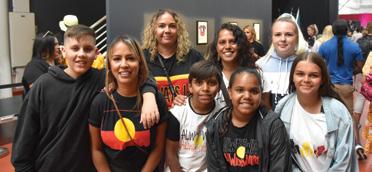
7 minute read
Inside: Survival Day 2021 on Kaurna land
Sur vival Day 2021 on Kaurna land
Thousands joined the Survival Day March on 26 January, starting at Tarntanyangga (Victoria Square) before making their way down King William Street towards Parliament House, chanting “Always was, always will be Aboriginal Land” – protesting for the date of Australia Day to be changed.
Advertisement
The rally was organised by Natasha Wanganeen who said: “As you can see there’s a lot of non-Indigenous people here today and that’s amazing because they’re going to be a part of change. We don’t need Australia Day anymore. We need to make a new day that everybody can celebrate together.”
Following the march, Tandanya Aboriginal Cultural Institute hosted a Survival Day event where First Nations musicians, artists and dancers showcased their culture. The resilience of Aboriginal and Torres Strait Islander Peoples was celebrated on stage with the Survival Day theme, ‘still thriving, still surviving’ highlighted in every performance.
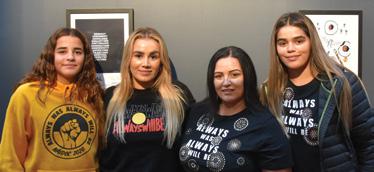
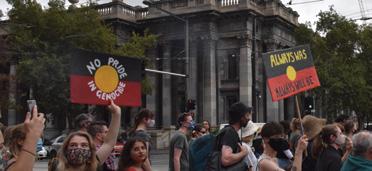
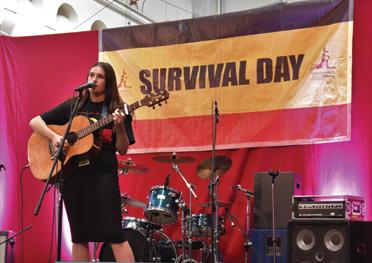
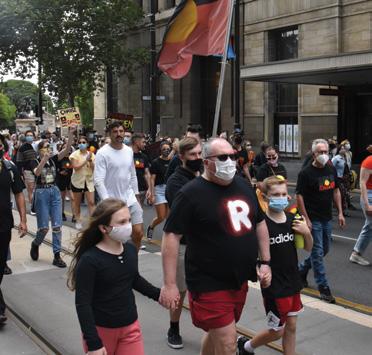
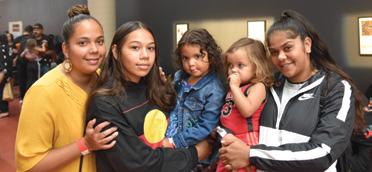
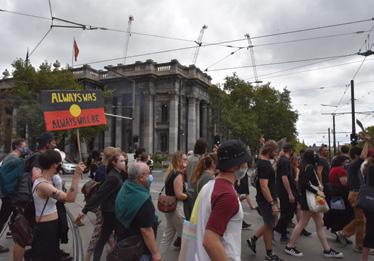
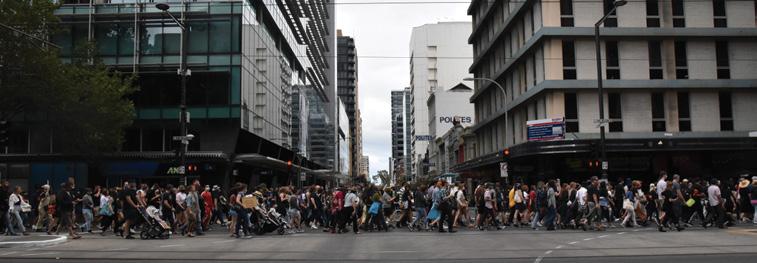
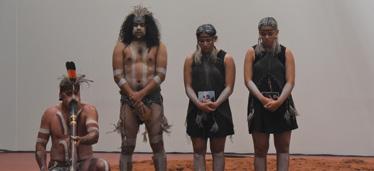
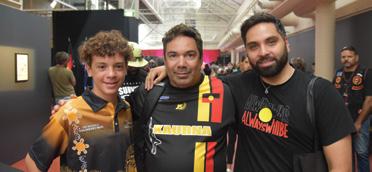
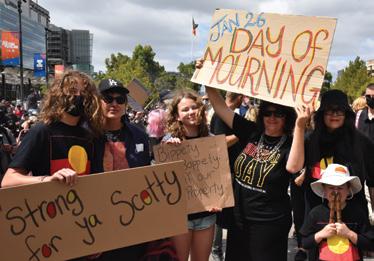
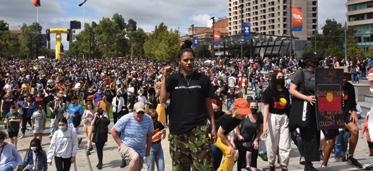
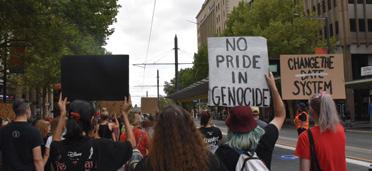
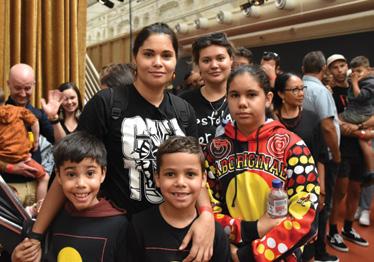
Inquiry finds Rio Tinto’s destruction of Juukan Gorge ‘inexcusable’, calls for Government to make Indigenous heritage protection a priority. “Never again can we allow the destruction; the devastation and the vandalism of cultural sites as has occurred with the Juukan Gorge – never again!” the report titled Never Again begins. The interim Parliamentary inquiry into the Juukan Gorge has condemned mining giant Rio Tinto and called for it to pay compensation to the Puutu Kunti Kurrama and Pinikura (PKKP) people and for a full reconstruction and remediation of the site.
“Rio Tinto’s conduct reflects a corporate culture which prioritised commercial gain over the kind of meaningful engagement with traditional owners that should form a critical part of their social licence to operate,” the report by the Joint Standing Committee on Northern Australia states.
It condemns not only Rio Tinto, but also the Western Australian Government for approving the works back in 2013; the Australian Government; their own lawyers and native title law.
The Committee also highlighted the failure of Western Australia’s Aboriginal Heritage Act 1972 (WA) and recommended that protecting Indigenous heritage should be a priority of all governments, and that the best way to achieve this is to ensure that adequate legal protections are in place for Indigenous heritage. “The States and Territories and the Commonwealth have an absolute obligation to preserve our Indigenous heritage for the benefit of all Australians, and corporate Australia can no longer ignore the link between its social licence to operate and responsible engagement with Indigenous Australia,” said the inquiry’s Chair, The Hon. Warren Entsch MP.
“The Committee has made the point all the way through this inquiry that the destruction at Juukan Gorge has not just impacted on a small and discreet group of traditional owners in the middle of the Pilbara; it has robbed a significant piece of history from all Australians – from the world.”
The report goes on to urge the mining company to make a number of commitments including reconstruction and remediation of the site; reviewing all agreements with traditional owners; putting a moratorium on existing Section 18 approvals to destroy cultural heritage and lifting gag clauses or other restrictions on traditional owner’s rights. The National Native Title Council (NNTC) welcomed the report and these recommendations.
“Compensation to the PKKP must go beyond restoring the site. It should be calculated with reference to the native title compensation precedent set by the High Court last year, which spoke to economic loss and cultural loss for the community. It’s incredible to imagine what such a figure would be for a 46,000-year-old site of world heritage significance. That figure should go far beyond the $135 million price tag Rio put on the iron ore when it bombed Juukan Gorge,” said NNTC CEO, Jamie Lowe.
“Any restitution or remediation work Rio Tinto undertakes in relation to Juukan Gorge, as recommended in the report, is the absolute bare minimum they should be doing. It’s highly doubtful they would undertake any of these works if they were not in the public spotlight. Cultural change in such companies is fanciful; the mining sector cannot be trusted to self-regulate. It is the responsibility of Federal and State governments to implement strong cultural heritage laws.”
Professor Marcia Langton, anthropologist and decedent of the Iman people of Queensland, said that you can’t compensate for the loss felt by the traditional owners of the land.
“Rio Tinto owes something to the traditional owners for breach of trust. You can’t compensate for this terrible loss, but you can compensate for the denial of their rights under the Indigenous land use agreement and the denial to their future generations for this site,” Ms Langdon told ABC radio.
“How can you punish a mining company? You make them pay compensation.” Due to the sheer scale of evidence the inquiry has been broken into several phases, with the next phase set to take a broader view of the issues, looking at the experience of other jurisdictions and the role of the national government in the protection of Indigenous heritage. The report is due out in March 2021.
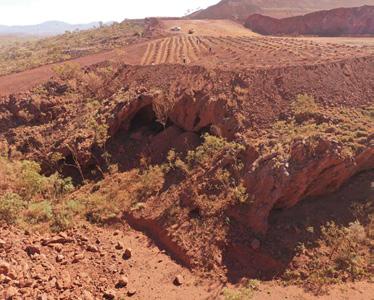
Juukan Gorge. Photo: Puutu Kunti Kurrama And Pinikura Aboriginal Corporation.
A voice of the Aboriginal communit y to the Parliament of South Australia
South Australia’s Commissioner for Aboriginal Engagement, Dr Roger Thomas, said Aboriginal South Australians continue to experience institutional and systemic racism, even in their dealings with Government, in his historic address to parliament.
The Kokatha and Mirning man was invited to report on his activities to the House of Assembly on their final day of sitting in December, where he recognised being the first Aboriginal person to present the voice of his people on the floor of the chamber. He used the opportunity to address his concern around ongoing exclusions and inequalities still faced by Aboriginal people in South Australia, which he warned must be attacked and rejected.
“While there have been genuine efforts by Government to address Aboriginal disadvantage, Aboriginal people continue to lag behind the rest of the community in nearly every social, economic and health indicator available to us,” said the Commissioner.
Dr Thomas was appointed South Australia’s Commissioner for Aboriginal Engagement in July 2018. In December of that year, Premier Marshall announced a two-year Aboriginal Affairs Action Plan with 32 specific actions. One of these was to develop a model to facilitate and enable better engagement between the Government and Aboriginal communities to help Aboriginal voices have better representation in Government decision making.
A major part of the Commissioner’s work over the last two years has been this Aboriginal engagement reform, and he has spent a lot of time in consultation with Traditional Owners and community members across the state, bringing their concerns and opinions “independently and honestly to Government”. for Aboriginal people – women, children and families; justice and corrections; health and wellbeing; housing and homelessness; education and training.
“Lack of progress suggests that these issues are intractable,” said Dr Thomas. “Let me tell you they are not.”
He therefore proposed a new model of engagement, an Aboriginal Representative Body which would be comprised of elected and appointed members directly accountable to the Aboriginal community, something “we have not had in South Australia before”.
He also spoke of his disappointment that progress on these reforms had so far been curtailed by COVID-19 and a lack of funding received in the State Budget.
“While I welcome assurances that some funding will be provided through Aboriginal Affairs and Reconciliation until 30 June 2021, I do not believe it is appropriate that the establishment of a genuinely representative Aboriginal voice to Parliament be funded from an already reduced budget for Aboriginal Affairs and Reconciliation,” said Dr Thomas.
“Despite the revised funding allocation, my office will continue its work to establish an Aboriginal representative body in the latter half of 2021.”
Premier Steven Marshall addressed this in his response.
“I welcome this first report by Dr Thomas which provides frank commentary on a number of issues of concern as well as discussion about policies and programs to improve the lives of Aboriginal South Australians,” Premier Marshall said.
“COVID-19 has caused some delay in consultation with Aboriginal communities about the new engagement model but as we move to its establishment, the Government will ensure adequate resources are provided to enable regular engagement with the Parliament as well as government ministers and agencies.”



